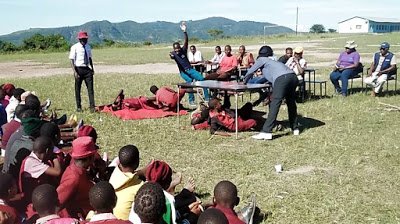Stephen Ephraem
CHIPINGE
– The European Union (EU) is supporting efforts by the Civil Protection Unit
(CPU) to save lives of learners and communities in areas hit by Cyclone Idai and are prone to other natural
hazards.
– The European Union (EU) is supporting efforts by the Civil Protection Unit
(CPU) to save lives of learners and communities in areas hit by Cyclone Idai and are prone to other natural
hazards.
A
project called Education in Emergencies- Education Access, Disaster
Preparedness and Child Protection (EiE-APP) is being implemented in schools of
Chipinge and Chimanimani districts.
project called Education in Emergencies- Education Access, Disaster
Preparedness and Child Protection (EiE-APP) is being implemented in schools of
Chipinge and Chimanimani districts.
The
project is being driven by a consortium of development partners namely World
Vision as lead partner, Plan International and Save the Children.
project is being driven by a consortium of development partners namely World
Vision as lead partner, Plan International and Save the Children.
The
partners came up with two teams of members of the Civil Protection Committee at
national, provincial and district level
who visited the two districts for drills aimed at capacitating learners
to use readily-available resources for disaster preparedness.
partners came up with two teams of members of the Civil Protection Committee at
national, provincial and district level
who visited the two districts for drills aimed at capacitating learners
to use readily-available resources for disaster preparedness.
Consortium
leader Dr Tapiwa Muzerengi said the purpose of implementing the project was to
inculcate disaster preparedness skills in both teachers and learners.
leader Dr Tapiwa Muzerengi said the purpose of implementing the project was to
inculcate disaster preparedness skills in both teachers and learners.
He
said it was a measure to heighten capacity to respond to emergencies so as to
reduce the impact of natural disasters.
said it was a measure to heighten capacity to respond to emergencies so as to
reduce the impact of natural disasters.
“As
a consortium, we received funding from European Union Civil Protection and
Humanitarian Aid (ECHO) to compliment the Government of Zimbabwe’s bid to
protect children from natural disasters, protect children’s rights in emergencies
and to ensure that education continuity is guaranteed before, during and after
an emergency.
a consortium, we received funding from European Union Civil Protection and
Humanitarian Aid (ECHO) to compliment the Government of Zimbabwe’s bid to
protect children from natural disasters, protect children’s rights in emergencies
and to ensure that education continuity is guaranteed before, during and after
an emergency.
“We
are imparting knowledge, exchange information in an interactive way which is
simple, lively and easy to remember in children so that they are equipped with
life- saving skills in case of any emergency be it floods, gusty winds,
lightning you name it,” said Muzerengi.
are imparting knowledge, exchange information in an interactive way which is
simple, lively and easy to remember in children so that they are equipped with
life- saving skills in case of any emergency be it floods, gusty winds,
lightning you name it,” said Muzerengi.
“Children
are getting skills on various issues which include, rescue and relief,
communication in emergencies, fire fighting, first aid, physical protection,
health matters and hygiene, child protection in emergencies and road safety. People
should be able to use readily-available resources at their schools, homes and
communities in cases of any emergency. The use of locally-available resources
is both affordable and time-saving,” he said.
are getting skills on various issues which include, rescue and relief,
communication in emergencies, fire fighting, first aid, physical protection,
health matters and hygiene, child protection in emergencies and road safety. People
should be able to use readily-available resources at their schools, homes and
communities in cases of any emergency. The use of locally-available resources
is both affordable and time-saving,” he said.
The
drills programme was organised
by the Plan International programme area manager Stanley Dawa.
drills programme was organised
by the Plan International programme area manager Stanley Dawa.
In
Chipinge, disaster risk reduction trainings were carried out in Rutengeni,
Mbire, Christina, Rusitu Valley, Ndiadzo, Samhutsa, Tanganda, Junction Gate,
Foroma, Mapungwana, Chimana, Glassflats, Tuzuka, Nyaututu, Birirano, Chisuma,
Matikwa and Rimai Primary School.
Chipinge, disaster risk reduction trainings were carried out in Rutengeni,
Mbire, Christina, Rusitu Valley, Ndiadzo, Samhutsa, Tanganda, Junction Gate,
Foroma, Mapungwana, Chimana, Glassflats, Tuzuka, Nyaututu, Birirano, Chisuma,
Matikwa and Rimai Primary School.
Mapungwana,
Tuzuka and Nyaututu secondary schools also benefitted from the training
sessions.
Tuzuka and Nyaututu secondary schools also benefitted from the training
sessions.

